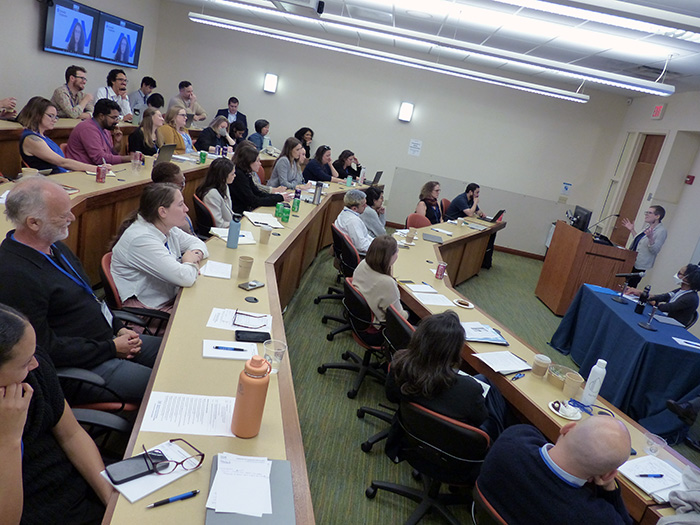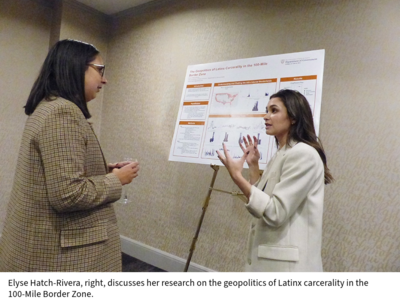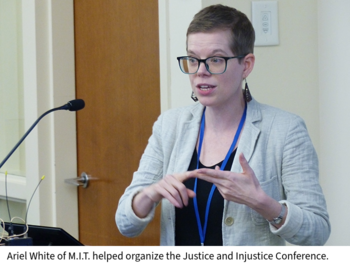Yale Hosts Conference on the Politics of Crime and Punishment

To Benjamin Justice, the criminal justice and education systems possess similar virtues and defects when it comes to civics.
Both utilize a curriculum to shape how people within the system think about their relationship to the government, how they feel about themselves, and which skills they develop. He also sees a divide between what organizations say they do — their formal curriculum — and what they do in practice — a hidden curriculum, which can undermine their stated purpose.
“The courtroom is like a stage where the script of justice is performed, but the reality behind the scenes tells a different story,” said Justice, a professor in the Rutgers University Graduate School of Education’s Department of Educational Theory, Policy, and Administration. “The hidden curriculum of the courtroom whispers lessons of power and privilege that the formal curriculum tries to mask.”
Justice presented a chapter of an upcoming book last month at the annual Justice and Injustice Conference at the Institution for Social and Policy Studies (ISPS), hosted by ISPS’s Center for the Study of Inequality (CSI), co-directed by Allison Harris and Dara Strolovitch. His presentation struck a theme threaded throughout the two-day event, as scholars shared their research on the politics of crime and punishment.
“Courts have their own messaging that they project to people accused of crimes and which is very different from the beautiful buildings on the outside,” Justice said. “The architecture of justice is grand, but the lived experience within its walls can be dishearteningly mundane.”
The event began seven years ago as a one-day mini-conference at the American Political Science Association’s annual meeting, organized by Laurel Eckhouse, now a data scientist with the United State Digital Service; Harris, an assistant professor of political science and faculty fellow at ISPS; Hannah Walker, an associate professor of government at the University of Texas at Austin; and Ariel White, an associate professor of political science at the Massachusetts Institute of Technology.
“It’s hard to believe this is already our seventh year,” Harris said when welcoming the attendees. “This conference represents one of the highlights of my career so far. I am so proud to see all of the work being done on the politics of criminal justice, inspired by the collaborations we have facilitated, and excited to once again come together to share what we have learned and chart a way forward.”
Strolovitch underlined the purpose of the conference and the Center for the Study of Inequality.
“CSI exists to advance high-quality, multidisciplinary conversations, collaborations, and community among scholars working on the politics of race, class, ethnicity, indigeneity, gender, sexuality, and other axes of inequality in politics and public policy,” she said. “Especially — but not only — in the United States. These are always timely topics, but I feel they are especially urgent now.”
In addition to Justice, presenters included Michael Mueller-Smith of the University of Michigan on mismeasurement of race and ethnicity in the U.S. criminal justice system, Milena Ang of Universitat Pompeu Fabra on racialized human rights violations in Mexican prisons, Kaneesha R. Johnson of the University of North Carolina, Chapel Hill on demonstrating discriminatory legislative intent, Benjamin Muñoz of MIT on the impact of victim attention on election participation, Dvir Yogev of the University of California, Berkeley on police as political agents, Elizabeth Jordie Davies of the University of California, Irvine on demanding police accountability in Chicago, Leah Christiani of Hunter College on how narratives of events influence police violence, Kristen Brock-Petroshius of Stony Brook School of Social Welfare on whether deep canvassing can promote anti-carceral attitudes, Yale Political Science Department Chair Gregory Huber on decomposing the sources of criminal justice attitudes in the United States, Robert Stewart of the University of Maryland on felony status and political identity, Anna Gunderson of the University of Texas, Austin on descriptive representation and perceptions of artificial intelligence in policing, Isabel Laterzo-Tingley of the University of Texas, Austin on law enforcement and electoral politics, Tyler Reny of Claremont Graduate University on the entertainment media origins of policing attitudes, and Andrew McCall of Columbia University on the local roots of racial mass incarceration.
The conference also featured a roundtable panel on grants and a poster session featuring the work of emerging scholars.
“Political science has lagged a bit behind other social sciences in addressing criminal justice and crime,” said Lisa L. Miller, a professor of political science at Rutgers. “What is great about this conference, is that over the years it hasn’t just helped people come together but cultivated new scholars to do this work. Because young people in this discipline need to feel like there’s a community here for them. And this explosion of research is a real credit to the young scholars who decided to form this conference.”
White, one of the event’s founders and organizers, expressed pride in the efforts of conference participants to grapple with how to apply academic inquiries toward practical applications that enhance justice.
“You see people thinking about, for example, what is going wrong with measurement right now as we even just try to figure out what the disparities are within the system that we can improve so that we give policymakers better tools for understanding what’s going on,” White said.
In addition, she felt optimistic about positive change even in the current polarized political climate.
“You see a lot of support for changing the system in specific ways,” White said. “Not everybody agrees on everything, but you do see some bipartisan coalitions around specific changes that are hard to imagine in other policy realms.”
Walker, another co-founder and organizer, also expressed optimism about the role researchers can play in improving the criminal justice system.
“More and more, a lot of folks here are evaluating policy outcomes,” Walker said. “I think knowledge about how the world works matters. It matters to policymakers, and it matters to individuals who are impacted by those policies.”
Kevin Morris, a senior research fellow and voting policy scholar at the Brennan Center for Justice, attended the conference and saw the need for academic research in his center’s work, which includes legal advocacy for people who are disenfranchised because of a felony conviction or for people who are legally allowed to vote but cannot cast a ballot because they are detained or imprisoned on Election Day.
“Academics love to talk about things like causal inference and coming up with regression estimates,” Morris said. “But I think the big role we can play is storytelling. Empirical research is important, but we need to also talk to reporters and testify before Congress. What’s important is taking these stories and not just telling them to one another.”